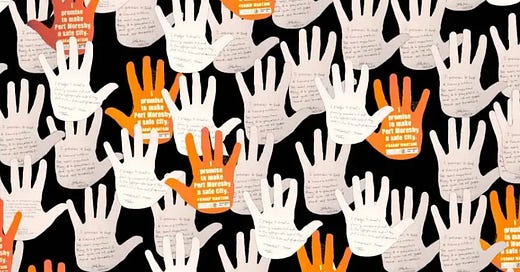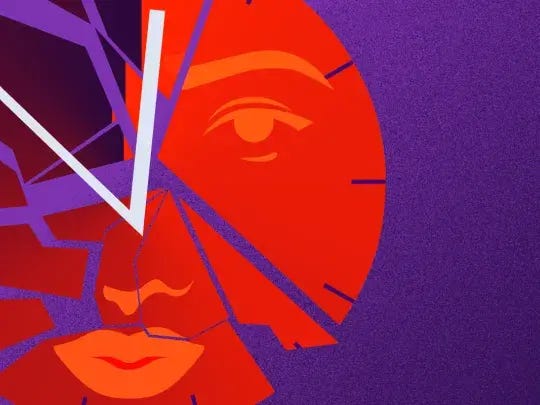16 Days of Activism Against Gender Based Violence - Why we must shine a spotlight on the impact of violence on incarcerated women
November 2024 newsletter from Women Beyond Walls - together we can build collective power and amplify voices to end the over-incarceration of women and girls worldwide.
Dear Friends
This month we mark the UN’s International Day for the Elimination of Violence against Women on 25 November. This day recognises violence against women as “one of the most prevalent and pervasive human rights violations in the world”, with almost one in three women having been subjected to violence, including sexual violence or intimate-partner violence, at least once in their life. This year will mark the launch of the UNiTE campaign from the 25 November to the 10 December 2024, an initiative of 16 days of activism which “will draw attention to the alarming escalation of violence against women to revitalise commitments, call for accountability and action from decision-makers.”
For incarcerated women globally, violence is prevalent both inside and outside of prison. Many women in the criminal legal system have experienced violence and trauma before incarceration, including sexual violence and domestic abuse. Women in Prison note that in the UK almost two in three women in prison have experienced domestic abuse. Often women’s incarceration is closely linked to their experiences of violence and abuse, for example being pressured or coerced into committing a crime by a partner, or committing a crime in order to help them leave an abusive relationship or protect their family. Whilst incarcerated, women are then vulnerable and at significant further risk of violence. A report from the California Institution for Women highlights the extent of sexual abuse women faced at the hands of male prison officers, who then forced these women to stay silent with threats of of confinement or impact to their sentences. One woman poignantly shared that “we’re not only prisoners in here, we’re women, and we’re reminded of that through widespread male violence.”
So, as we embark on the 16 Days of Activism Against Gender Based Violence, and hear calls for action from decision makers, it is important we shine a spotlight on the impact of violence on incarcerated women - both in contributing to rising rates of incarceration, as well as their continued risk of further violence once incarcerated.
Please tag Women Beyond Walls on LinkedIn or Instagram in any events or campaigns you are planning during this period so we can amplify your important work.
Women Beyond Walls news
Women Beyond Walls no longer active on X - We will no longer be active on the social media site X (formerly Twitter). After careful consideration, we feel that the platform no longer aligns with our values. The harmful content promoted on X, including far-right conspiracy theories and racist narratives, stands in stark contrast to our mission which centres around inclusivity, equality, and social justice. We believe our time and energy is far better spent building community and amplifying voices in other digital spaces. Our account on X will remain for now, but will no longer be posting or engaging on there in any other way. You can still find us via our website, on LinkedIn, Instagram and you can follow our news via our newsletter.
In October, Tithandizane Comfort Home, UP Zambia and Women Beyond Walls wrote a letter to the Zambian government advocating for detained women to be pardoned during Zambia's 60th Independence Day celebrations, in particular vulnerable groups such as women with children, elderly women and women with medical needs. We were pleased that numerous women were pardoned! This work builds on the dialogue we held in October 2023 with Tithandizane Comfort Home, bringing together various groups together to discuss how to increase alternatives to imprisonment in Zambia.
We will be attending the AWID Forum in Thailand in December - please reach out if you will be there too. We would love to meet up!
We would also love for you to join us at the upcoming event: The criminalisation of women in poverty: Case study on sex work in the Netherlands. The event is on Thursday 28th November from 5pm-6.30pm at the Amsterdam Law Hub, University of Amsterdam. The event is part of the WO=MEN’s campaign focusing on strengthening the feminist movements in the Netherlands and surrounding Beijing+30 and the Beijing Platform for Action (BPfA). We are thrilled to be co-organising the event with Penal Reform International, the Campaign to Decriminalise Poverty and Status, Bureau Clara Wichmann, La Strada International, and the Amsterdam Law Hub.
News from around the world
Australia: Australian filmmaker Shalom Almond debuted her film, Songs Inside, at the Adelaide Film Festival from October-November of this year. The film follows a group of incarcerated women as part of a unique music program in an Australian prison, writing songs and learning instruments. The film sees the music become “a tool for self-discovery” as well as a means of opening up issues around trauma and addiction through their personal songs.
Iran: The Iran Human Rights Organisation has reported an increase in executions within Iran, with 166 people being executed in October - the highest monthly figure for over 20 years. This included at least six women.
Sierra Leone: The West African Regional Court has held that Sierra Leone’s loitering laws are discriminatory and ordered for them to be reformed. The case was brought by AdvocAid and IHRDA. The Court ruled that Sierra Leone’s loitering laws violate rights to equality, non-discrimination, and freedom of movement, disproportionately impacting marginalised individuals. Under the Public Order Act of 1964 and the Summary Conviction Offences Ordinance of 1906, individuals can be arrested based on subjective police assessments, often resulting in arbitrary detentions of low-income individuals. AdvocAid also highlighted egregious abuses faced by women, who reported being coerced into non-consensual sex by officers if they couldn't pay bribes. This ruling sets a crucial legal precedent across Africa, urging countries to review and reform colonial-era laws that perpetuate inequality and criminalise poverty. The Court’s decision sends a clear message that laws targeting society's most vulnerable must be updated to protect human rights.
UK: The UK government has announced an Independent Sentencing Review and a Call for Evidence. Sonya Ruparel, Chief Executive of Women in Prison, has noted that the review could change women’s experiences of criminalisation as it “marks a pivotal moment and significant opportunity to transform the way women are treated by the justice system.” Sonya also notes the appointment of experts in violence against women and girls to the panel, hoping that this will ensure the review “takes into account and responds to the fact that so many women in the criminal justice system are also survivors of domestic abuse and other experiences of inequality.” You can find details of how to submit views and evidence in opportunities below.
Uruguay: The Uruguayan government has signed a deal for construction of a new prison for women, including transgender women. Data published in 2024 estimates Uruguay, with 449 prisoners per 100,000 inhabitants, to have one of the highest prison population rates in not only South America, but the world.
Opportunities
REDRESS is pleased to invite applications for financial support for Strategic Litigation Against Torture, Litigation Workshops, and Casework Costs focused on addressing torture in the context of protests and discrimination against LGBTIQ+ persons. The deadlines for applications are in November, December and rolling so we’d advise checking the individual deadlines. Details suggest priority will be given to applications from Africa and Latin America, but strong applications from other regions will be considered. You kind find more information and how to apply here.
The UK Government has called for evidence for its Independent Sentencing Review 2024 to 2025. The Call for Evidence is open for eight weeks (from 14 November 2024 until 9 January 2025). The government is welcoming views from all those who have an interest in the area, details of which you can find on the government website.
Working Chance, a UK based charity supporting previously incarcerated women to build the confidence and knowledge to lead independent lives outside of prison, are recruiting an employability coach.
This Is Me - Let’s Get Free’s 7th Art Show is featuring the work of over 80 incarcerated artists as well as 60 artists in solidarity with ending mass incarceration. The exhibition is running at the Irma Freeman Center for Imagination in Pittsburgh, USA, until the 24th November.
APT is launching their report on Women in Prison on 12 December. The report features analysis from National Preventive Mechanisms from 46 countries across Africa, Asia-Pacific, Europe, and Latin America. You can register here.
Media and literature recommendations
Listen to the recent episode of On The Recyard Women’s Prison Podcast. In this episode the hosts discuss “the unique culture of formerly incarcerated women, exploring the social dynamics, shared values, and unspoken rules that shape this resilient community.” The episode explores important issues including understanding women with a background of incarceration, navigating stigma and dismantling stereotypes, and providing non-judgemental support to previously incarcerated women.
The Ministry of Justice in the UK posted its quarterly update on Safety in Custody, looking at deaths, self-harm and assaults in prison custody in England and Wales. You can also find Women in Prison’s response to the statistics here.
Read a BBC article on the safety and support for incarcerated women post-release from prison. The article includes the experiences and perspective of Dainya Ebanks, who struggled with the lack of support post-release from prison at the age of 20 which left her feeling as though she was safer in prison.
Watch a clip of Holloway, an upcoming feature documentary which follows six formerly incarcerated women return to a now empty Holloway Prison, formerly one of the largest women’s prisons in Europe. The film sees the women reclaim their stories and revisit memories, and has recently been announced as the winner of the BFI London Film Festival 2024 Documentary Audience Award. You can also read the BBC’s article on the documentary here.
Read The Global State of Harm Reduction 2024 Report which provides a global analysis of harm reduction in response to drug use. The report notes that groups facing marginalisation, including women and incarcerated people, are underserved in the practice of harm reduction. The report highlights that for incarcerated people, including women, harm reduction services are often inadequate and do not meet the need levels given the high-risk drug use in prison. To learn more, check out this IDPC course on Drug Decriminilisation available in a variety of languages.
Listen to A Proposal for Resisting Darkness - an audio drama created by Clean Break with a group of women at HMP Downview prison and playwright Yasmin Joseph during a series of workshops.
You can check out more reading resources on our website - let us know if you have anything to add!
Thank you for following our newsletter, if you find it useful please share it with friends. Please also continue to share your news and important work that you want to be featured and tag us on social media so we can support and amplify.
With gratitude to the community,
The Women Beyond Walls Team






